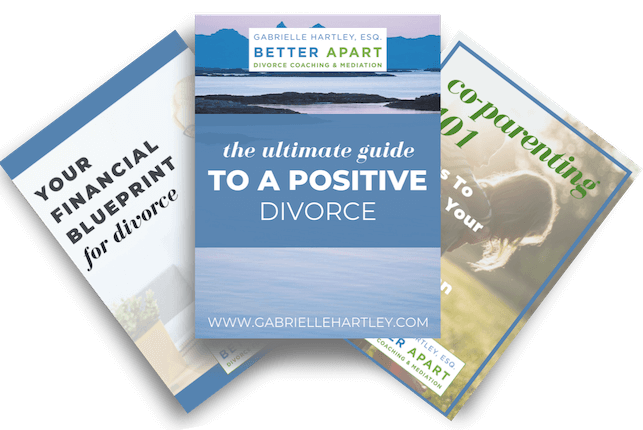Back in the ‘70s when my parents were getting divorced, there was no such thing as divorce stress. People were just supposed to cope and move on. When my mother gave up our dog while I was away at school, she sent me a letter saying just that “there were a lot of changes.” My best friend’s mother consoled me for coming from a broken home by telling me not to worry because “home is where you hang your hat.” My father became one of the first people in America to own a Lancia, which was a fancy Italian sports car made by Fiat. My mother withdrew, which was probably better than self-medicating with alcohol or Valium like some others in her circle. Today is a more enlightened time. Mediation was rarely used. While people still get divorced, they are allowed to recognize that they are under stress and there are resources like this blog that can help you deal with it and be happy and healthy.
Even the most amicable divorce can be stressful because it involves change. Routines and familiarity bring comfort and divorce disrupts that as people move, relationships and friendships get severed, and finances become uncertain. If you turn things up a few notches by adding a custody dispute, a fight over alimony and child support or a long and bitter court case, the stress can be brutal.
All that divorce stress takes its toll. Humans are still designed to be hunter gatherers and stress sets off the fight or flight reaction. When our ancestors saw a sabre toothed tiger, their blood pressure would rise, their heart rate would increase, their bodies would release the stress hormones adrenaline and cortisol, and their blood sugar level would go up to have extra energy available. They would then either fight the tiger or run from it. If they escaped the threat, the stress would be released and their bodies would calm down.
Now, while we no longer face sabre tooth tigers, our body perceives the stress of going through a divorce the same way and the fight or flight mechanism kicks in—but it is not released by fighting or running. While you anticipate the next court date or wait for the support payment to come, to your body it is as if the perceived threat never ends. The stress builds up and you become anxious, irritable, and depressed. One can develop high blood pressure and heart disease, as well as diabetes from high blood sugar. Your body craves calories to keep its energy level up so people turn to calorie dense junk food which can lead to becoming obese. Obesity presents its own health problems such as heart disease, certain types of cancer, and even arthritis.
Get Some Exercise
One of the best ways to release that stress and the effects of the fight or flight reflex is to exercise. Lifting weights or going for a run acts as a substitute for an encounter with a sabre toothed tiger. Afterwards, your blood pressure, heart rate, and blood sugar will be lower. Exercise will also cause your brain to produce endorphins, which are chemically similar to opiates and stimulate the brain’s pleasure centers, so you will feel happier and less anxious. That court date will still be out there or the support check may still be late, but you will feel less stressed.
You should exercise at least three days a week in a well-rounded exercise routine which involves weightlifting for strength, stretching for flexibility, and some aerobic exercise for cardiovascular health. In addition to alleviating the effects of stress, exercise will improve your overall health. It will help to prevent obesity by raising your metabolism so you will burn fat. It will also cause you to make new neural connections in your brain, build muscle, and have denser bones. Exercise will also boost your immune system so you will be more resistant to COVID-19 and will prevent the underlying conditions which make the disease more severe.
The current pandemic has closed many gyms, but there are many on line exercise programs available you can do at home. A good way to lower stress is to do a mindful stretching routine where you focus on your breathing. As you stretch, concentrate on inhaling and exhaling to a count of three while staying in the moment. It will get you centered so that you can take on the challenges of the day.
If you have children, get them involved, even if it is just kicking a soccer ball around. They have been cooped up without school gym or youth sports and need the exercise. It will also lower the divorce stress they are feeling.

Stay Hydrated
An often overlooked source of stress is dehydration. Sitting in a heated or air conditioned home or apartment, especially if you are sheltering in place all day, can cause dehydration well in excess of 1.5% as we lose water while our lungs moisten the dry air we breathe. This can lead to feelings of anxiety, as well as fatigue, difficulty concentrating, headaches, and impaired memory.
The simple cure for dehydration is to drink more water. Don’t wait until you are thirsty. You should make hydration part of your routine and drink throughout the day.
Eat Well
To be well you have to eat well. If you eat wholesome food, you will feel better and less stressed. You should eat a balanced diet of protein, carbohydrates, and fats. You need protein because your muscles and organs are made of protein. You should eat about 1g. for every 2 pounds of bodyweight daily from lean meat, chicken, and fish spaced out over three meals and a healthful afternoon or post exercise snack. Try a filling whey protein smoothie or peanut butter on whole wheat bread instead of a 500 calorie grande latte.
You need carbohydrates for energy. Give your brain and body the fuel they need with good carbs such as fruits, vegetables, whole grains, and pasta. You also need fat for fuel and to maintain the brain, nerves, and other organs. Eat good fats from olive oil and oily fish like salmon. To help you eat well, always eat a breakfast of protein, carbs, and fat such as eggs with toast or oatmeal and fruit. This will keep your blood sugar level and give your brain the fuel it needs so you won’t crave sugary junk later.
Sleep Well
The final piece to support your wellness and lower your stress is to get seven and a half hours of sleep a night. Sleep helps in so many ways from enabling your body to recuperate from exercise to improving memory to preventing obesity. You will be sharper the next day and ready to take on your new life and new world.

Robert Herbst is an internationally known expert on fitness, wellness, weight loss, and drug free sport. As a powerlifter, he has won 19 World Championships and 38 U.S. National Championships and set 38 world records. He was a semi-finalist for the 2013 Sullivan Award given to the nation’s outstanding amateur athlete and is a member of the AAU Strength Sports Hall of Fame. He is quoted frequently in national publications such as Men’s’ Fitness, Prevention, Reader ‘s Digest, and Women’s Health and has appeared on numerous radio shows and podcasts. A New York attorney, he supervised the drug testing at the 2016 Rio Olympics and is Chair of the New York State Bar Association Working Group on Physical Health. He is a graduate of Columbia Law School and Trinity College, where he was elected to Phi Beta Kappa and was Salutatorian of his class. You may contact him through www.w8lifterusa.com.
Some links and posts are from our sponsors. Here’s how it works.
P.S. Want more tools and resources to stay positive during a divorce? Download my Free Divorce Survive & Thrive Kit below!

Get Your FREE Divorce Survive & Thrive Kit!
Includes a financial blueprint for divorce, a co-parenting guide, and the BEST strategies to help you stay positive and take care of yourself during divorce and beyond.
[mailerlite_form form_id=2]


Revolutionizing the conversation around Divorce, one internal narrative at a time.
MENU
FOLLOW GABRIELLE
DISCLAIMER: The commentary, advice, and opinions from Gabrielle Hartley are for informational purposes only and not for the purpose of providing legal advice or mental health services. You should contact an attorney and/or mental health professional in your state to obtain advice with respect to any particular issue or problem.
CONTACT GABRIELLE
NORTHAMPTON ADDRESS: 76 Masonic Street, Northampton, MA 01060
NYC ADDRESS: 150 East 52nd Street, Suite 1002, New York NY 10022
STATEN ISLAND ADDRESS: One Edgewater Plaza Suite 304, Staten Island, NY 10305
PHONE: 413.341.0034/ 917.757.0980

